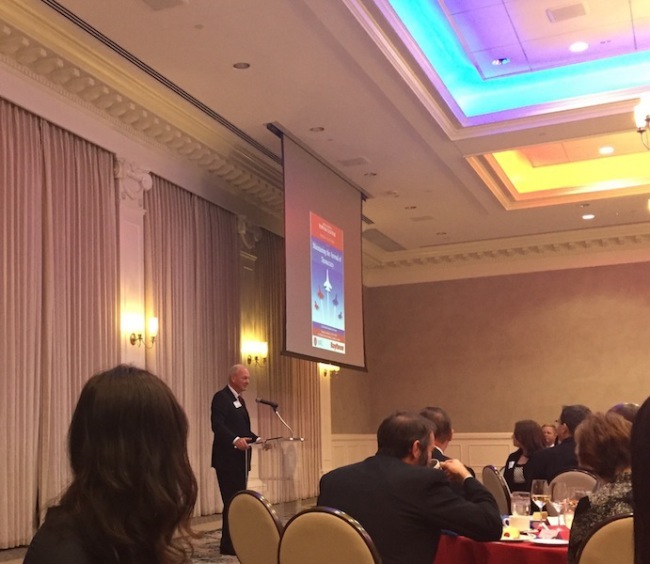Editor’s note, Dec. 7, 1:50 p.m.: This story has been updated throughout.
The Umphrey Lee Center’s Mack Ballroom echoed with voices on Thursday evening as more than 75 guests dined on hors d’oeuvres and sipped beer and wine.
The crowd was gathered for the John Goodwin Tower Center for Political Studies’ eighth annual National Security Dinner. The keynote speaker, Gen. Craig R. McKinley, spoke on the topic of this year’s theme, Maintaining the Arsenal of Democracy.
Luisa del Rosal, the programs and external relations director for the Tower Center, said the event centers on a fundamental topic in today’s world.
“There hasn’t been a time in our history that national security has been more prevalent, but less discussed,” said del Rosal.
Del Rosal also noted that in past years the dinner has been held as part of a larger conference on national security. Making the dinner a solitary event is part of the “rebranding” of the center’s Security and Strategy program. The goal is to host more events featuring experts with first-hand experience in their fields.
After dinner was served, Dr. Joshua Rovner, the John G. Tower distinguished chair of international politics and national security, introduced McKinley.

McKinley, an Air Force veteran and current president and CEO of the National Defense Industrial Association, began his speech with a discussion of national security at the time of Franklin D. Roosevelt’s presidency.
“‘We must be the great arsenal of democracy,’” McKinley said, quoting Roosevelt and referencing the dinner’s theme. “That’s where the phrase came from, and that’s where we need to revisit ourselves today.”
He detailed the changing landscape of the United States’ defense industry, continuing through Eisenhower’s presidency and into today.
“The phrase ‘military-industrial complex’ has persisted for over half a century, but the complex to which it refers has not,” said McKinley.
He explained that since the end of the Cold War, the defense industry has not only become smaller and part of the private sector, but incredibly specialized. In 1961, 16 defense and defense-related companies ranked in the top 100 of the Fortune 500. Today, that number is four.
McKinley noted that unprecedented technological advancement within the defense industry will be essential in the future, leaving behind “the outdated perception of a politically intrusive, sprawling complex that only exists in the history books.”
Junior Thomas Blas, a political science and history double major, said that attending Tower Center events highlighting experts like McKinley allow him and other political science students a peek at their future.
“It’s just something interesting to come listen to see, what is the reality? What can my degree bring? What can I do in the real life?” Blas said.











